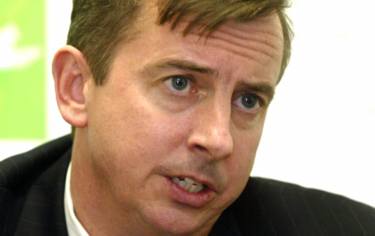Bush is a moron - and his Meet the Press performance proves it!I finally got a chance to sit through the Meet the Press interview. Having already read the transcript twice, I was able to just focus on Bush's rhetorical performance. Here are my impressions:
1. I was impressed by his good spirits/affable mannerisms. He seemed truly at ease throughout the interview, and that surprised me considering that he seemed to have a stick up his ass during the Diane Sawyer interview. He mostly avoided his signature deer in the headlights look. I can see how many people (most of whom failed to finish grades K-12) might find this simple man endearing.
2. He came off like a doofus. No other way to describe it. He didn't seem to understand the meanings of many of the questions. Often politicians dodge or weave around questions - Bush stumbled around them as if he was altogether impervious to their meanings (this isn't to say he didn't do his share of question dodging).
3. This guy can't put whole sentences together. That would be fine if he had been born with stuttering problem, but he wasn't.
Here's a letter that conservative Andrew Sullivan published on his website:
EMAIL OF THE DAY: "I happened to be in favor of the war in Iraq. I also think you've selected a quotable piece of the President's interview in which he tried to defend his actions in taking the country to war, even in the absence of evidence that Iraq possessed WMD at the time the war was launched. That said, I sense that you did not watch the President's full interview on Meet the Press. It was the single worst performance by an elected official on that show that I've ever seen. The President was inarticulate in the extreme; he avoided answering almost every semi-difficult question, repeatedly asking permission to "step back" as a way to provide a canned statement about how he's had to make tough decisions during times of war (i.e., don't second guess any decision I made regarding Iraq); and he often seemed to fail to grasp the meaning of various questions, pausing awkwardly for long periods of time before giving non-responsive answers. Not exactly the type of performance that breeds confidence in your commander in chief. On the issue of the huge debt/deficit, he simply noted that the economy was heading into a recession when he started, that his tax cut was responsible for improving the economy, and he seemed to try to blame Congress for a failure of political will when it comes to spending, as if he'd sent Congress a plan for balancing the budget. It was utter nonsense."
The reader is correct. I've only seen clips and will try and see the whole thing later. Of course, most people will only see the clips as well, so maybe the whole impression won't matter. But the impression I get from readers who saw the whole thing is that Bush seemed completely out of his depth. Even on Fox News, the juxtaposition of Bush's folksy chatter and Kerry's booming voice must have the White House worried.Even conservative columnists like Sullivan are beginning to turn against Bush. Much of it has to do with simple intellectual pride. It hurts one's pride when a fool is the national spokesman for their ideology. I have a few conservative friends who like Bush's tax cutting but find him to be an idiot, and it's not an unreasonable position, I suppose. Surely there are coherent arguments for slashing taxes or invading Iraq, but Bush is unable, do to mental incompetence, to express them.
